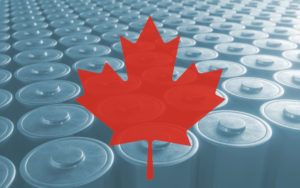While China continues to lead the BloombergNEF tally, Canada’s strengths in raw materials, ESG factors and industrial infrastructure helped it jump three spots, one ahead of the U.S.

BNEF ranked 30 leading countries’ lithium-ion battery supply chain performance based on 45 metrics across five key themes. Canada is the only country with top-10 results across the board.
While China continues to lead the BloombergNEF tally, Canada’s strengths in raw materials, ESG factors and industrial infrastructure helped it jump three spots, one ahead of the U.S.
“Don’t sleep on Canada!”
That’s a key takeaway from BloombergNEF’s 2022 global lithium-ion battery supply chain ranking, released at a BNEF event over the weekend in Bali, Indonesia, ahead of this week’s G20 Summit, according to a tweet by Nat Bullard, BNEF’s chief content officer.
The BNEF report ranks 30 leading countries’ lithium-ion battery supply chain performance based on 45 metrics across five key themes: availability and supply of key raw materials; manufacturing of battery cells and components; local demand for electric vehicles and energy storage; infrastructure, innovation, and industry as well as environmental, social and corporate governance (ESG) considerations.
On those measures, Canada ranked third, eighth, tenth, fourth and sixth — a solid top-10-or-better across-the-board showing that no other country could match.
Increasing competitiveness
“Canada’s recent investment in its upstream clean energy supply and increasing demand in the US-Mexico-Canada Agreement (USMCA) region increases the country’s competitiveness,” wrote BNEF in a release accompanying the new report.
The United States, which ranked second last year, dropped to third, despite strong growth in battery demand due to passage of the Inflation Reduction Act, BNEF states. While it posted a strong top-10 ranking in four categories, the U.S. ranked only 16th in ESG.
“This year, the changes in the overall rankings were mostly driven by the greater access to several key raw materials and manufacturing capacities domestically,” said Allan Ray Restauro, metals and mining analyst at BNEF and lead author of the report, in the same release.
“Success in the battery supply chain is increasingly determined by more than one category or metric. A solid foundation on domestically realized resource wealth, bolstered by responsible and ethical production, is the main theme of the rankings this year.”
China leads the ranking in three of the five categories — raw materials, battery manufacturing and downstream demand. According to BNEF, it currently hosts 75 per cent of global battery cell manufacturing capacity and 90 per cent of anode and electrolyte production.
At the same time, BNEF says, the tide is shifting.
“Despite this growth, other countries are enforcing policies to create battery demand and secure raw materials needed to support their transition to electric vehicles.”
European countries, for the most part, fell in the 2022 rankings. The only exceptions were Finland and Czech Republic (Czechia), with the former placing fourth overall on the strength of its metals supply chain, clean grid and quality infrastructure.
Unlike Canada, most resource-rich countries rank low overall because they generally lack domestic battery manufacturing capabilities and EV demand, BNEF notes.












